Kickin’ it with Elijah Grant about Pippin, Gen Z and his future in theater
 Pippin closed at the Alliance for the Arts on November 24. The ambitious musical had an enthusiastic and energetic cast of 30 that included Yuliana Garcia as The Leading Player, Kagan Vann in the role of Charlemagne, Giselle Meyer as his duplicitous wife Fastrada, Dylan Sneddon as her incestuous son, Lewis and Madeline Ritter as widowed mother Catherine.
Pippin closed at the Alliance for the Arts on November 24. The ambitious musical had an enthusiastic and energetic cast of 30 that included Yuliana Garcia as The Leading Player, Kagan Vann in the role of Charlemagne, Giselle Meyer as his duplicitous wife Fastrada, Dylan Sneddon as her incestuous son, Lewis and Madeline Ritter as widowed mother Catherine.
Elijah Grant reprised the title role.
Now a sophomore, Elijah traces his love of theater all the way back to second grade.
“I went to Gulf Elementary 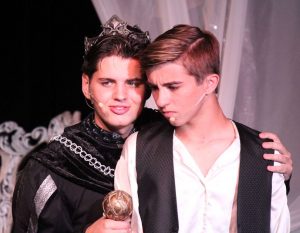 and they had this program where if you got straight “A”s, you got to see the musical as your reward. It was the first one I’d ever seen, and I knew I had to try out for the show the following year when I got into third grade.”
and they had this program where if you got straight “A”s, you got to see the musical as your reward. It was the first one I’d ever seen, and I knew I had to try out for the show the following year when I got into third grade.”
The show Elijah saw that day was Annie and as luck would have it, one of the young actors who 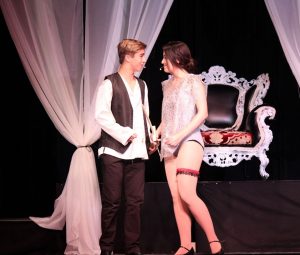 inspired Elijah was none other than Yuliana Garcia, who was in the fourth grade. Not only did Elijah not know Yuliana (K-2 was in one building and Grades 3-5 were in another), he did not know she was in Annie that day until both sat down with me to talk about their roles in Pippin.
inspired Elijah was none other than Yuliana Garcia, who was in the fourth grade. Not only did Elijah not know Yuliana (K-2 was in one building and Grades 3-5 were in another), he did not know she was in Annie that day until both sat down with me to talk about their roles in Pippin.
Gulf Elementary performed Willy Wonka Jr. Elijah got a part as an oompa loompa.
“Lucky for me, I was 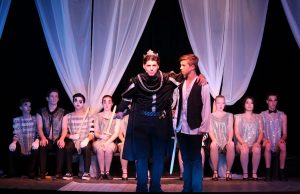 very short,” he quips. “From there, I just fell in love with performing and I’ve been in at least one musical every year.
very short,” he quips. “From there, I just fell in love with performing and I’ve been in at least one musical every year.
His past credits include Spamalot the Musical, The Hunchback of Notre Dame and Sweeney Todd.
He played Anthony Hope in the latter show, a role that required him to perform his fist stage kiss.
“It really prepared 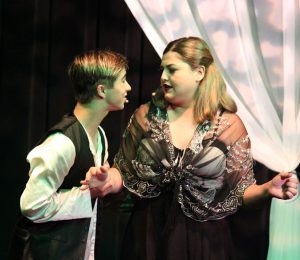 me for Pippin and being able to portray that love connection with Catherine,” Elijah supplies.
me for Pippin and being able to portray that love connection with Catherine,” Elijah supplies.
Of course, there’s more to Pippin than just the character’s tender love scenes with a widowed mom. In the show, Pippin has just graduated college and is desperately trying to find his niche in his father’s kingdom. After trying his hand at warfare, he takes a more hedonist path that includes sex with multiple partners 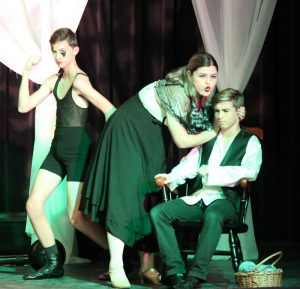 and even a group orgy. While these scenes are effectuated through suggestive dance scenes and innuendo, they nevertheless required a level of sensuality that Grant had not been called upon to display in any previous production.
and even a group orgy. While these scenes are effectuated through suggestive dance scenes and innuendo, they nevertheless required a level of sensuality that Grant had not been called upon to display in any previous production.
But it was the thematic content of the overall show that proved most challenging in portraying Pippin.
For the singing, acting and dancing to make sense to both them and the audience, the actors in 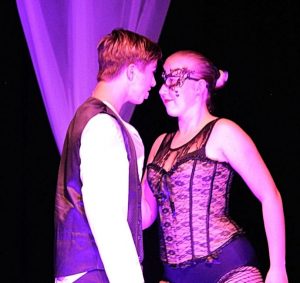 Pippin had to understand the musical’s themes and subthemes. That required the cast to spend four days with Director Carmen Crussard doing book work.
Pippin had to understand the musical’s themes and subthemes. That required the cast to spend four days with Director Carmen Crussard doing book work.
“It’s line by line looking for themes, defining characters and goals and really diving into the depth of the show,” notes Alliance Youth Theatre Choreographer and Costume Designer Lauren Perry. “We like challenging the kids and this one was definitely challenging.”
“Pippin … is trying to find meaning and fulfillment, and that required finding a connection with each scene [i.e. each rite of passage that Pippin undergoes] as the play unfolds. But at the same time, you have to be lost in yourself because each time Pippin finds an experience unfulfilling, it causes him to become increasingly depressed. It’s a drain on his psyche, and the hardest part was conveying that growing sense of disappointment and frustration at that very moment.”
Intended 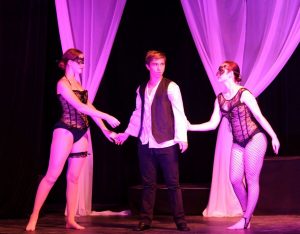 by Stephen Schwartz as a metaphor, Pippin actually resonates with teens and twenty-somethings to a surprising degree when you consider that the musical was penned in 1972. It’s not just that the “American Dream” seems so far out of reach for the vast majority of Gen X and Gen Z who find that in addition to stifling student loan debt, a four-year degree and uncompromising work ethic don’t guarantee a great-paying job with good benefits,
by Stephen Schwartz as a metaphor, Pippin actually resonates with teens and twenty-somethings to a surprising degree when you consider that the musical was penned in 1972. It’s not just that the “American Dream” seems so far out of reach for the vast majority of Gen X and Gen Z who find that in addition to stifling student loan debt, a four-year degree and uncompromising work ethic don’t guarantee a great-paying job with good benefits, 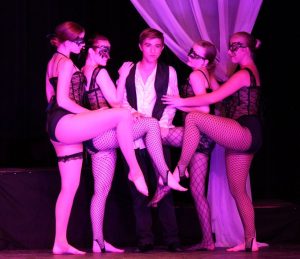 never mind home ownership and financial security. They may not even have a habitable planet in 50 years because of climate change and related ecological threats. It’s hard to start a career, business or even a family when you might be facing a climatological Armageddon before your 50th birthday.
never mind home ownership and financial security. They may not even have a habitable planet in 50 years because of climate change and related ecological threats. It’s hard to start a career, business or even a family when you might be facing a climatological Armageddon before your 50th birthday.
But in true Pippin fashion, Grant rejects pervasive pessimism. Echoing the sentiment expressed in Pippin’s character-defining  solo “Corner of the Sky,” Elijah believes that his generation will discover and introduce achievable plans to reduce gun violence, eliminate gender bias, decrease our carbon footprint and save the planet.
solo “Corner of the Sky,” Elijah believes that his generation will discover and introduce achievable plans to reduce gun violence, eliminate gender bias, decrease our carbon footprint and save the planet.
Indeed, members of Gen Z are establishing themselves as exemplary 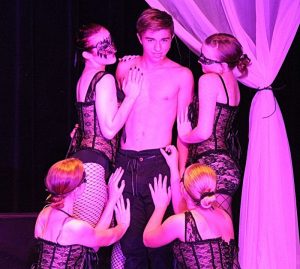 global citizens and planetary stewards with increasing frequency. By way of example, consider the strides taken in just the past year by climate activist Greta Thunberg, Marjorie Stoneman Douglass activists Sarah Chadwick, Cameron Kasky, Delaney Tarr, David Hogg and Jaclyn Corin (co-founder of March for Our Lives) and the legions of young women and girls associated with #GirlsToo and Girls for Gender Equality.
global citizens and planetary stewards with increasing frequency. By way of example, consider the strides taken in just the past year by climate activist Greta Thunberg, Marjorie Stoneman Douglass activists Sarah Chadwick, Cameron Kasky, Delaney Tarr, David Hogg and Jaclyn Corin (co-founder of March for Our Lives) and the legions of young women and girls associated with #GirlsToo and Girls for Gender Equality.
“My generation hasn’t 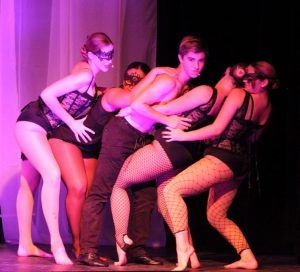 been corrupted by money or wealth yet,” Elijah adds optimistically. “That gives us an advantage because we’ve seen what [greed] does to our planet. We will change that. We just have to wait for our opportunity.”
been corrupted by money or wealth yet,” Elijah adds optimistically. “That gives us an advantage because we’ve seen what [greed] does to our planet. We will change that. We just have to wait for our opportunity.”
Although Leading Player gives Pippin plenty of opportunities to find his place and make his mark on the world, he never does. His continual failure predictably results in increasing depression, and that represented a huge challenge to Grant in properly 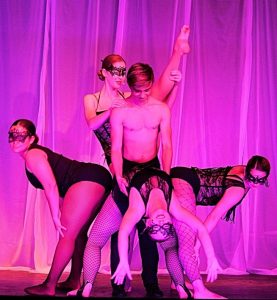 playing the role.
playing the role.
“While he doesn’t necessarily show [his growing despair] on the outside, it’s happening internally and, of course, The Leading Player and all the rest of them are egging it on and steering him toward the finale,” Elijah explains.
This growing sense of gloom and doom is crucial for the Grand Finale to make sense in the context of the storyline.
“There are little breaking points throughout the show, like ‘No Time at All,’ 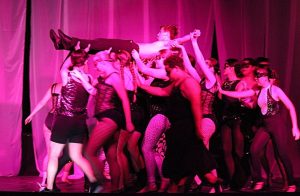 where Pippin does not have time to do all he wants to do because he’s all dragged out. So the Players bring him back up, just so they can dash his hopes again.”
where Pippin does not have time to do all he wants to do because he’s all dragged out. So the Players bring him back up, just so they can dash his hopes again.”
It’s a rollercoaster of emotion, but Grant handles it well in spite of his youth.
And he also handles the way in which Pippin’s relationship with 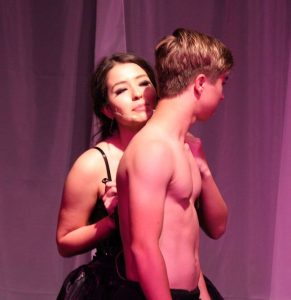 Leading Player evolves over the course of the play.
Leading Player evolves over the course of the play.
“At first, he just notices her. But as the play goes on, they make more and more eye contact and begin building a connection. She gains his trust, which has to happen before he’ll accept her guidance.”
Of course, he rejects her guidance in the end, refusing to immolate himself and settling, instead, for an ordinary and mundane existence – “trapped but happy.” But don’t be tempted to draw analogies to Pippin’s denouement and what’s likely to happen to Grant’s Z generation.
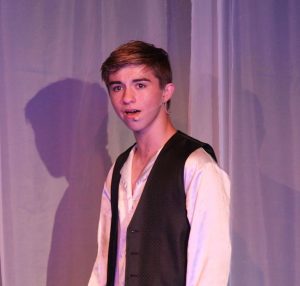 Pippin got what he did because he lacked the stick-to-it-iveness and commitment necessary to achieve anything worthwhile. It’s part of a pattern of self-sabotaging behavior that neither Grant nor the aforementioned activists demonstrate as they pursue their ambitious goals and objectives.
Pippin got what he did because he lacked the stick-to-it-iveness and commitment necessary to achieve anything worthwhile. It’s part of a pattern of self-sabotaging behavior that neither Grant nor the aforementioned activists demonstrate as they pursue their ambitious goals and objectives.
Elijah possesses a quantum of that same drive and determination in his quest for the extraordinary. In addition to repeatedly putting himself out there in terms of auditions, rehearsals and performances, he’s already 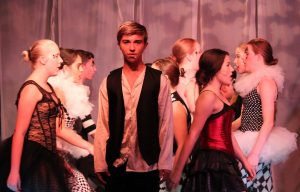 making plans to attend a college with a musical theater program such as the one offered by Florida State University (where his brother goes to school).
making plans to attend a college with a musical theater program such as the one offered by Florida State University (where his brother goes to school).
Who knows? Maybe he and Yuliana Gomez will be reunited for a third time. Gomez has her heart set on the musical theatre program at FSU as well.
“It’s not  just that you get to be someone you’re not for a while,” Elijah remarks, “ or that you get to put smiles on people’s faces. It’s that in the process, you get to make so many friends – not just because you’re in class together, but because you share a common interest. Everyone cheers you on. Everyone is so supportive.
just that you get to be someone you’re not for a while,” Elijah remarks, “ or that you get to put smiles on people’s faces. It’s that in the process, you get to make so many friends – not just because you’re in class together, but because you share a common interest. Everyone cheers you on. Everyone is so supportive. 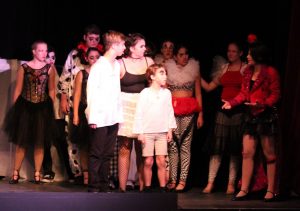 It forms a bond and camaraderie.”
It forms a bond and camaraderie.”
November 25, 2019.
RELATED POSTS.
- Pippin’s Yuliana Garcia has lots more stories to tell and magic to do just for you
- While daunting, Lauren Perry up to the challenge of choreographing ‘Pippin’
- Spotlight on resourceful ‘Pippin’ costume designer Lauren Perry













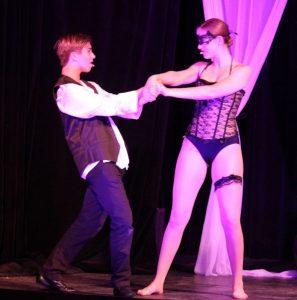

 Tom Hall is both an amateur artist and aspiring novelist who writes art quest thrillers. He is in the final stages of completing his debut novel titled "Art Detective," a story that fictionalizes the discovery of the fabled billion-dollar Impressionist collection of Parisian art dealer Josse Bernheim-Jeune, thought by many to have perished during World War II when the collection's hiding place, Castle de Rastignac in southern France, was destroyed by the Wehrmacht in reprisal for attacks made by members of the Resistance operating in the area. A former tax attorney, Tom holds a bachelor's degree as well as both a juris doctorate and masters of laws in taxation from the University of Florida. Tom lives in Estero, Florida with his fiancee, Connie, and their four cats.
Tom Hall is both an amateur artist and aspiring novelist who writes art quest thrillers. He is in the final stages of completing his debut novel titled "Art Detective," a story that fictionalizes the discovery of the fabled billion-dollar Impressionist collection of Parisian art dealer Josse Bernheim-Jeune, thought by many to have perished during World War II when the collection's hiding place, Castle de Rastignac in southern France, was destroyed by the Wehrmacht in reprisal for attacks made by members of the Resistance operating in the area. A former tax attorney, Tom holds a bachelor's degree as well as both a juris doctorate and masters of laws in taxation from the University of Florida. Tom lives in Estero, Florida with his fiancee, Connie, and their four cats.